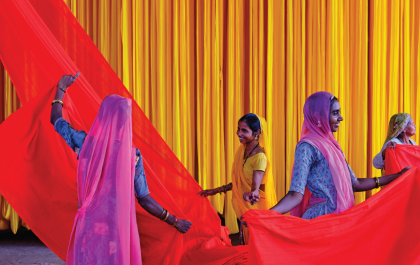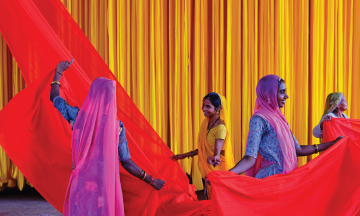In the end, all of life is assisted living – there should be no shame in that
By Abak Hussain
When I video-call my friend Herbert Tjossem, a retired professor of English living in Wisconsin, he is chomping through his breakfast. I do this from time to time just to check up on him. We became good friends during my undergrad days – though he was already retired even back then – and have stayed in touch almost continuously since.
He prefers mornings, which here in Dhaka is late at night. Is it a bother that I am interrupting this full and hearty breakfast? Not at all, he says, he enjoys the company. He props his iPad up on the dining table and I can see him forking down eggs while he asks about my family, whose names and whereabouts he remembers clearly.
If a fact slips his mind, he will take a minute to search. Don’t tell me, he says, I know this, it will come to me.
As someone whose appetite does not peak until later in the day, I have always viewed big breakfast-eaters with a mix of bewilderment and envy, and I ask Professor Tjossem what he is having. He lists the items for me methodically: Three eggs, bacon strips, a cup of milk, tea, toast with jam, and apple juice – which, he adds, he gets from the orchard by the gallon.
Apart from the three caretakers who come and go in rotating shifts, he lives alone in his large house in Appleton – the kids live in other cities and visit when they can, but obviously there are long stretches in between those visits when he needs to entertain himself.
I had to turn in my car keys a few years ago, he says with a slight touch of sadness, and have not been upstairs at all in recent times.
And now, ever since the ankle fracture, he is in a wheelchair and pretty much confined to the first floor. But the caretakers are diligent, and now on a 24-hour roster, so someone is always there, just in case, he assures me. His large house, located at a picturesque cul-de-sac of Appleton, is still very much his castle, where he mostly does as he pleases.
You do you, I tell him, admiring his continued defiance: You are having three eggs in the morning and loving it. Even I wouldn’t feel right about doing that.
Old age is not an equal opportunity employer
Professor Tjossem this month turned a full 100 years old – he was born in Iowa on March 14, 1923, sandwiched between the two world wars. When he draws on a century of memories, I feel like a mere fetus. In conversation, he can casually recall a time when America had no postal service, but he can also gently flex how good he has become with an iPhone.
Until quite recently, he was driving around town in his BMW, going up to the farmer’s market for his groceries, trimming the hedges on his garden, and running up and down the stairs with a youthful vigor that would have left me out of breath. Looking at him live his life on his own terms, largely take care of his own affairs, and still enjoy so much of it, one word pops out above all things: Independence.
Only a tiny minority of people in the world are as lucky as Professor Tjossem. Most of us dread the loss of independence, dignity, and life’s small pleasures that come with passing time. My father-in-law, a quarter-century younger than Professor Tjossem, is a dialysis patient who would not be allowed so much as a whiff of bacon (even if it could somehow be rendered halal) – let alone three eggs. A former bodybuilder with the appetite of a trencherman, his portions now – even his water consumption – are strictly controlled. Once the possessor of a military-man’s bone-crushing handshake, these days he struggles with bathroom doorknobs. Let’s face it: Life isn’t fair.
Beyond giving up simple pleasures though, as we age there is that nagging feeling that others around us will be burdened. And while good genes play an outsized role in independent aging (Prof Tjossem hit the jackpot – a rare case study), cultural attitudes also play a major part.
In the West, particularly in American society, independent living is generally encouraged. Realistic parameters are needed though – there comes a time when dad needs to be asked gently but firmly to give up his car keys, and that may be difficult if my old man is an exuberant soul who enjoys his joyrides, but there should never be compromises on physical safety.
On the other hand, there is so much that seniors remain capable of, and for them to enjoy their golden years to the fullest, it is important for that potential to be allowed to thrive. Whether or not assisted living is right for someone is a serious conversation that needs to be had, and it is not a one-size-fits all. Not everyone can afford round-the-clock care. Bangladeshi culture, though, imposes an expectation on families that the elderly must always be in the care of their children, even when money is not the main issue.
But is that realistic? Children may have careers, not to mention children of their own, or may live far away. Besides, not all elderly people even have children. So we need to acknowledge the rights and needs of childless people as well – yes, they do exist! The upshot of various expectations from the next of kin is often a cycle of resentment, negativity, and compassion fatigue.
Assisted living should be seen as a healthy and positive option, not a form of neglect (you only need to look at the negative connotations of the term “old folks’ home” to get an idea of common perceptions). The all-too-familiar scenario in Bangladesh is no fun for anyone: Not for the children making sacrifices, not for the parent resenting their loss of autonomy. Professional care, if affordable, puts a lot of the control back in the hands of the patient – whether it is an at-home caretaker, or an assisted living home. Bangladesh still has plenty of catching up to do in providing more of both, but for that to happen, attitudes need to change first.
A small, personal declaration of independence
Getting old, or seeing our loved ones get old, can blindside us. In childhood, our parents seemed practically invincible – they were our go-to people for every need. It can be frustrating and heartbreaking to see these once-mighty figures now require help getting up from a chair, or putting on a pair of socks.
No doubt, some amount of guilt is there, as well as an element of existential dread at getting an early preview of old age. How does one face this reality? As we age, if we keep perceiving ourselves as decrepit and irrelevant, it can become a self-fulfilling prophecy. Similarly, as adult children, the positive feedback we give to our elderly parents makes a big difference to their sense of self-worth. Why force a parent into a hyper-dependent position, then? Why erode whatever joy they have left of life?
And yet, we must proceed with caution. At the end of the day, young, middle-aged, or old – none of us are islands and we all rely on a little help from time to time. There should be no stigma in reaching out for specialized, professional help, according to the specific needs of the patient. A realistic conversation on what those needs are, tough as that may be, can clear the air and ultimately improve familial, interpersonal relations.
I can already hear the derisive laughter of my detractors – they will say that my argument reeks of privilege, and that such professional care is too expensive, that most families simply have no choice but to take on the caregiving duties at the family level. But that is my very point: Should we not as a society try to change this daunting reality? Everyone deserves compassionate care, not just the super-rich or the ones with large, loving families that can share the load. It should all be made easier and more affordable than it now is.
March in Bangladesh is the month of independence. On March 26, 1971, this country declared independence from Pakistan, resulting in a nine-month war and eventual victory. My last video-call with Professor Tjossem, though, got me thinking about a very different sort of independence: The freedom to live with dignity and autonomy even after the years have taken so much away.
But this is not just about old age: It helps to remember that at any stage in life, accidents or illness can render us in need of special care. Even able-bodied young people call up plumbers, electricians, or mechanics when they need a hand. In that sense, all of life is assisted living.
When it comes to arranging care for elders, can we recognize their immediate physical needs while also respecting their emotional state? Assisting without smothering – that just might be the ticket to helping our aging parents take back their lives, and feel a sense of peace in their home stretch.
Abak Hussain is a journalist, and Contributing Editor at MW Bangladesh













